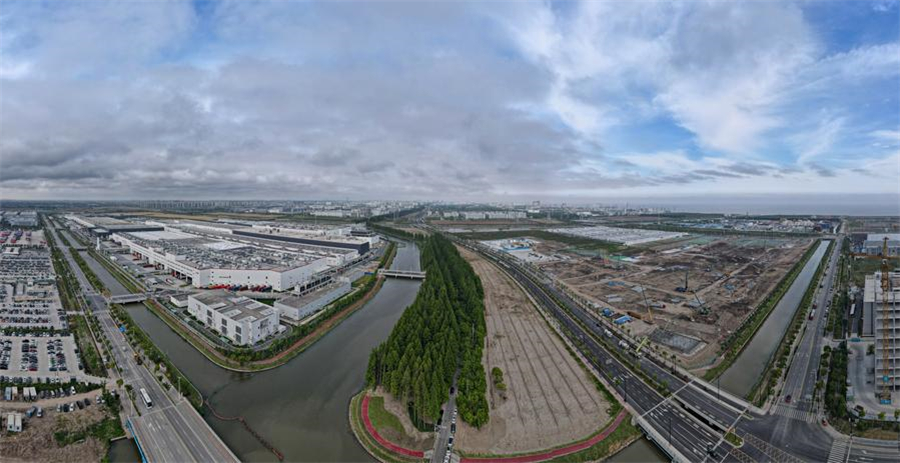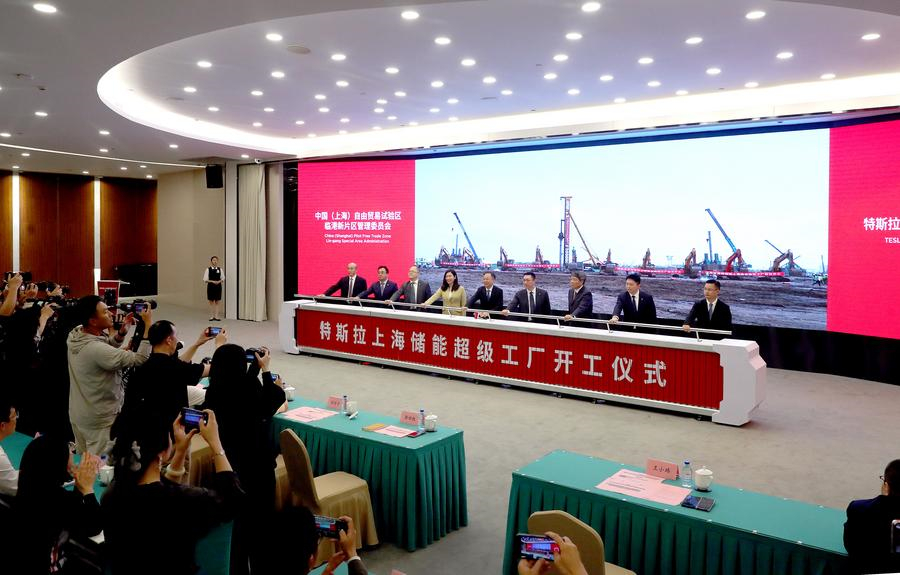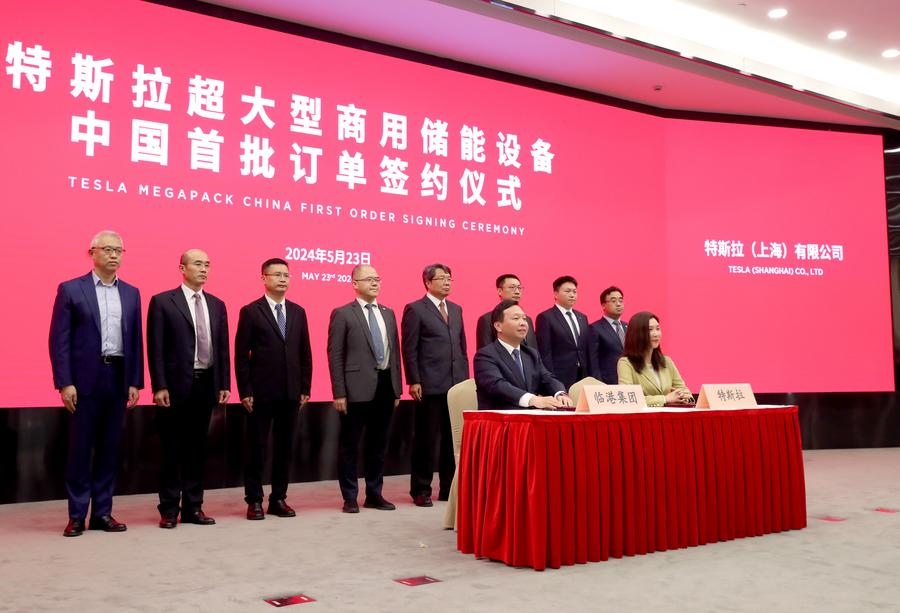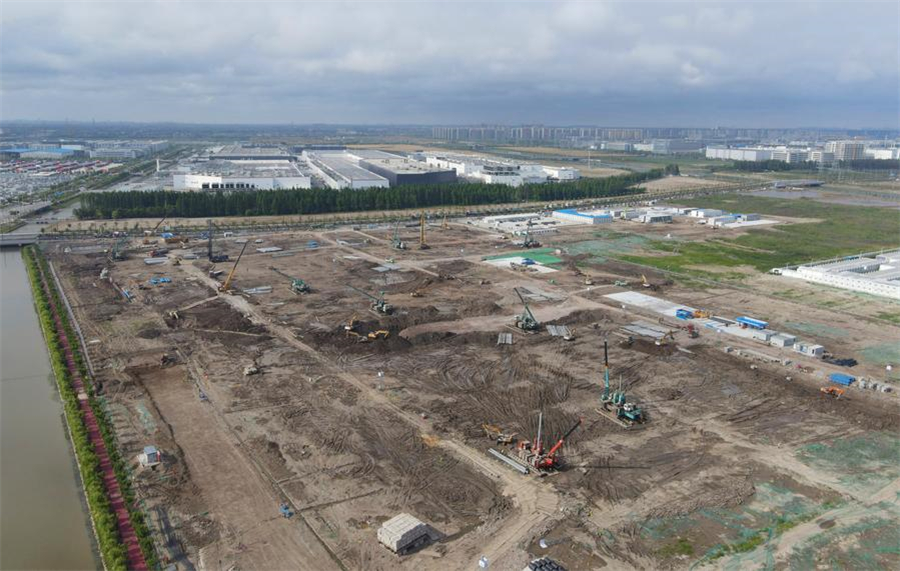Tesla's "milestone" Shanghai battery factory breaks ground
* U.S. carmaker Tesla broke ground on a mega factory in Shanghai on Thursday to manufacture its energy-storage batteries.
* It is expected to begin mass production in the first quarter of 2025, with an initial capacity of 10,000 Megapack units a year.
* As the global renewables powerhouse, China is a major market for energy storage.
SHANGHAI -- U.S. carmaker Tesla broke ground on a mega factory in Shanghai on Thursday to manufacture its energy-storage batteries, Megapacks, a project hailed by the company as a "milestone."
The latest move underscores Tesla's commitment to investing in the world's second-largest economy, defying the rhetoric of "decoupling" and "de-risking" from China ratcheted up by some U.S. politicians.
The new plant spans an area of approximately 200,000 square meters, with a total investment of around 1.45 billion yuan (about 203.94 million U.S. dollars), according to the administration of Lin-gang Special Area of China (Shanghai) Pilot Free Trade Zone.

An aerial panoramic drone photo taken on May 23, 2024 shows the construction site (R) of U.S. carmaker Tesla's Megapack factory in east China's Shanghai. [Xinhua/Fang Zhe]
The mega factory is the first of its kind built by Tesla outside the United States and the company's second plant in Shanghai, following the inauguration of its gigafactory in 2019 which involved an initial investment of over 50 billion yuan.
"I believe the new plant is a milestone for both Shanghai and Tesla," the company's vice president Tao Lin told Xinhua in an exclusive interview.
"In a more open environment, we can create a new Tesla speed at the Megapack factory, and supply the global market with large-scale energy-storage batteries manufactured in China," she added.
At Thursday's groundbreaking ceremony in Shanghai, Tesla representatives and local government officials formally launched the construction of the Megapack factory, which is expected to begin mass production in the first quarter of 2025, with an initial capacity of 10,000 Megapack units a year.
"With Tesla's benchmark project, we anticipate that within the next three to five years, an industrial cluster centered around energy storage will rapidly emerge," said Lu Yu, an official of the Lin-gang Special Area Administration.

This photo taken on May 23, 2024 shows the groundbreaking ceremony of U.S. carmaker Tesla's Megapack factory in east China's Shanghai. [Xinhua/Fang Zhe]
After the ceremony, Tesla signed a deal with Shanghai Lingang Economic Development (Group) Co., Ltd., securing the first batch of orders for its Megapacks in China.
Gong Wei, vice president of Lingang Group, said the Megapacks would be used for energy storage in a data center in the Lin-gang Special Area, as part of its efforts to achieve carbon peaking and carbon neutrality.
Tesla's deep involvement in the energy storage industry now rivals its electric vehicles in importance, Tao said, adding that its energy storage products are currently used in over 60 countries and regions.
The U.S. company already has a factory for its Megapacks in California, which has an annual capacity of 10,000 units.
Each Megapack unit can store over 3.9 megawatt-hours of energy, sufficient to power approximately 3,600 households for one hour.

This photo taken on May 23, 2024 shows the signing ceremony of the first batch of orders for Tesla's Megapacks in China in east China's Shanghai. [Xinhua/Fang Zhe]
As the global renewables powerhouse, China is a major market for energy storage. Last year, its installed renewable energy capacity surpassed thermal power for the first time, accounting for approximately 50 percent of the global additions to renewable energy capacity.
Tesla's plan to open a Megapack battery plant in Shanghai was announced In April 2023, cementing another foothold for the company in China. The land acquisition deal for the project was signed in December of the same year, and it received a construction permit earlier this month.
Lauding China's efforts in developing new energy industry, including the energy storage sector, Tao said the country boasts complete industrial chains, vast market potentials, and a production and business environment crucial for enterprise growth.

An aerial drone photo taken on May 23, 2024 shows the construction site of U.S. carmaker Tesla's Megapack factory in east China's Shanghai. [Xinhua/Fang Zhe]
In January 2019, Tesla broke ground on its Shanghai Gigafactory, becoming the first company to benefit from a policy allowing foreign carmakers to establish wholly-owned subsidiaries in the world's largest automotive market and one of the fastest-growing EV markets.
The gigafactory delivered 947,000 vehicles in 2023, an increase of 33 percent from the previous year. It has emerged as Tesla's primary vehicle export hub, with more than half of its global deliveries of over 1.8 million electric vehicles last year originating from there.
Thursday's groundbreaking ceremony for the Megapack plant comes less than a month after Tesla CEO Elon Musk visited China, during which he said the company is willing to deepen cooperation with China to achieve more win-win results.
China's faster-than-expected economic growth of 5.3 percent in the first quarter reaffirms its attractiveness for foreign investment. The number of newly established foreign-invested firms in the country hit 12,000 during the period, up 20.7 percent year on year.
Reporting by Cheng Lu, Zhou Rui, Yang Xiaojing, Chang Yuan and Yang Youzong; Video reporters: Ding Ting, Zhou Rui, Yang Youzong and Fang Zhe; Video editors: Zhang Qiru, Zhu Jianhui and Wang Han.
























